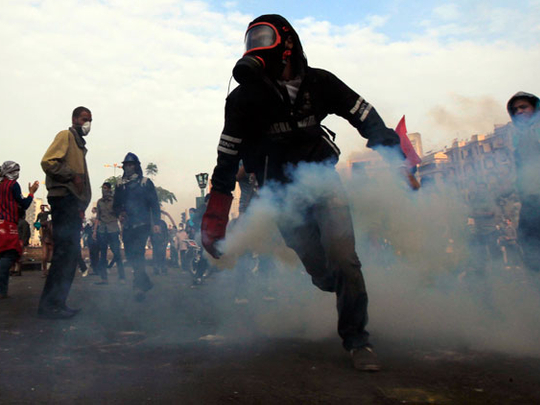
Cairo: Almost four months after becoming Egypt’s first elected Islamist president, Mohammad Mursi is at the centre of sharp controversy, with opponents branding him as a dictator while backers praising him as a revolutionary.
“Since he took office, he has done nothing good to this country,” said Ebrahim Mansour, a political commentator. “He has not managed to extricate Egypt from the bad situation in which the generals landed it during the transitional period when they allied with the Muslim Brotherhood,” added Mansour.
Mursi, a senior official in the formerly banned Muslim Brotherhood, took over in late June from the military who had ruled Egypt for 16 months after a popular revolt forced long-standing president Hosni Mubarak to step down. The transitional period was replete with violent protests against the military who was accused of misruling or even keeping the Mubarak regime intact.
Weeks after his inauguration as a president, Mursi, an engineering professor by profession, caused a big stir by ordering the reinstatement of the parliament in which Islamists had a clear majority, a month after the Supreme Constitutional Court had dissolved it. Mursi backed down. He later sent top generals, including the military ruler Hussain Tantawi, to retirement and retook the legislative power.
Last month, he incensed the judiciary by dismissing the top prosecutor Abdul Majuid Mahmoud, appointed under Mubarak. But Mursi allowed Mahmoud to stay in the post under pressure from the judges.
Last week, Mursi angered his opponents issuing a decree making his decisions and laws immune to judicial review and replacing Mahmoud. The decree has largely divided Egypt and sparked violent clashes between supporters and opponents. Mursi said his decree aimed at protecting the “revolution” and “achieving social and political stability”. The judges said they would go on strike until Mursi reverses his decree, which also bars courts from dissolving an Islamist-controlled assembly drafting a new constitution.
He, moreover, ordered a retrial for officials already acquitted of involvement in attacks on protesters during the anti-Mubarak uprising.
“Mursi has not succeeded in preserving the spirit of the revolution that unified the people for 18 days [the duration of anti-Mubarak protests] in pursuit of freedom, justice, dignity and democracy,” said Mansour, who is a columnist in Al Tahrir newspaper, a vociferous critic of the Brotherhood. “He has only succeeded in dividing the people along the lines of Fascist, religious terms of reference, which are alien to genuine citizenship and democracy.”
Mansour also accused Mursi of failing to revitalize the national economy, hard hit by turmoil in the wake of Mubarak’s exit. “He has followed in the footsteps of the Mubarak regime, with the result being more debts, a runaway inflation and a higher budget deficit…. Has he done this with approval from the US and Israel?”
Mursi last week generated worldwide praise for mediating a truce between Israel and the Hamas, ending eight days of deadly Israeli attacks on the Gaza Strip. Hamas is an offshoot of the Brotherhood.
His backers, however, say Mursi’s moves are seeking to fulfil the goals of the revolution and uproot the Mubarak regime.
“The people long awaited President Mursi’s decisions, especially after the emergence of a group of judges who adopt certain political stances,” said Essam Al Erian, a senior official in the Brotherhood’s Freedom and Justice Party.
“The president has used his legislative authority and issued a constitutional decree to safeguard national interests. His moves always seek to promote public interests and not to settle scores,” he added.
The Brotherhood has called for a mass rally to show support for Mursi in Cairo on Tuesday, when the opposition plans massive protests.












